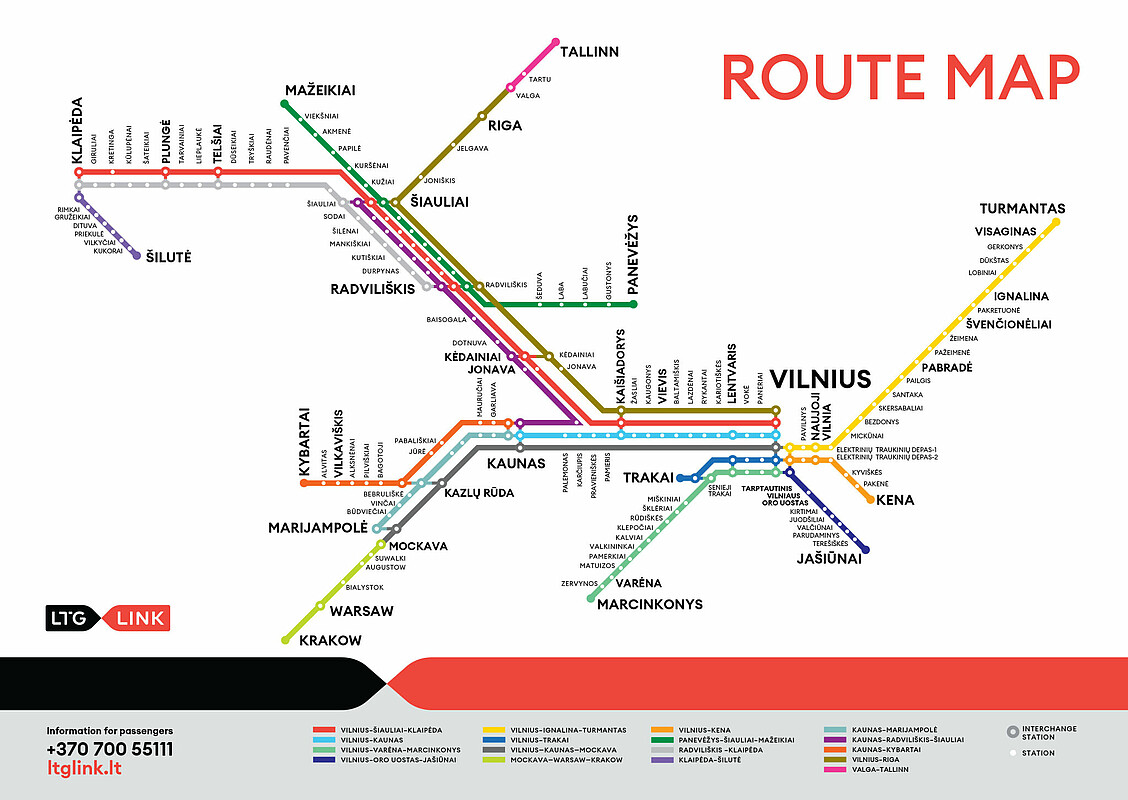As of 2025, LTG Link has become a new member of FTE. We used the opportunity of the FTE conference to meet its motivated employees: Violeta Šimelionienė, the Head of International Development, and Dangis Rupeika, International Passenger Services Project Manager.
Welcome on board, and welcome to Ljubljana, at the first FTE meeting since you joined the community. Can you provide a brief overview of LTG Link and the key services you offer?
Thank you for your warm welcome. It is a pleasure to join the FTE conference for passenger traffic and to have this great opportunity to meet with various people from different railway companies.
LTG Link is a passenger railway undertaking (RU) based in Lithuania, where we currently provide the ultimate majority of our services and where we transport most of our 5 million passengers per year. Our intercity trains connect major cities like Vilnius, Kaunas, Klaipėda, and Šiauliai, as well as we serve a few regional routes. In the cross-border service, we with our partners offer the passenger service to Poland, Latvia and Estonia.
What motivated you to join FTE?
The philosophy and mission of LTG Link have changed over time, our company is going more and more international. Joining FTE has for us two dimensions.
Firstly, we want to learn and contribute to the ongoing development of European rules and processes. Establishing an international train is not as easy as a national train, and this must change. It is a mission of FTE, which we fully support. Hopefully, by being at the same table with other RUs, we can propose standards for the whole of Europe. It is better than being only a subject of the rules coming from EU law or in the future European Network of Infrastructure Managers.
Secondly, FTE is a community. As members, it is much easier for us to discuss our ideas at conferences with potential partners. Similarly, we can also talk to other RUs that operate in different parts of Europe and benchmark our ideas.
Can you give an example?
For instance, the road sign used today at railway crossings in Lithuania is still the old steam locomotive symbol. LTG Link's mission is to persuade passengers to consider travelling by train as their preferred option. The ecological aspect is becoming increasingly important, and even such a small thing does not contribute positively to the perception of rail transport as a green mode. At the FTE community, we can immediately ask other RUs how it is handled in their countries and see if an alternative has been implemented elsewhere.
As you mentioned in your example, many of the issues related to the competitiveness of railways are not in the hands of RUs, but for instance, managed by public authorities or IMs.
Infrastructure managers should serve as good service providers to RUs so that we can focus our energy on passengers, rather than on administration and issues related to network access.
The state and development of the infrastructure are very important for the competitiveness of travel times. A very special project is Rail Baltica, which will introduce widely the standard European gauge to Lithuania, Latvia and Estonia. There are many open questions related to it, for instance when it will be ready and what will be the access conditions. As an RU, we also have to make strategic decisions about the operational concept and rolling stock for crossing the gauges. Rail Baltica and the old wide-gauge network will surely operate in parallel for a longer time, and operations should not be completely separated if we have the customer in focus.
What can you, as an RU, do to attract customers to the railways?
The customer experience is key and is in the hands of RUs. Offering modern trains with Wi-Fi, air conditioning, and bicycle spaces is just part of it. Another important step is to provide a competitive timetable, offering direct trains abroad. If that is not possible, we aim to minimise transfers and coordinate them. From December 2022, we re-opened connections between Lithuanian and Polish cities with one coordinated transfer in Mockava (Lithuania), organized with our partner in Poland, PKP Intercity. We have successfully established the Vilnius-Riga connection since December 2023. From February 2025, with the assistance of our partner Vivi in Latvia, we offer direct trips to other beautiful Latvian cities (Cēsis, Sigulda, etc.). By collaborating with our partner Elron in Estonia, we offer customers connections between Tallinn, Riga, and Vilnius with just one coordinated transfer in Valga (Estonia). For travel in these directions, it is sufficient to purchase a single ticket on the LTG Link website or those of our partners. This year we aim to improve our existing routes - from December 2025, together with our partner PKP Intercity, we expect to significantly reduce the travel time between Lithuanian and Polish cities.
Last but not least, RUs control ticketing and customer service. The LTG Link strategy is to provide travel options that will be at the top of customers' decision-making lists. Currently, most people in our region do not consider trains as an option for travelling abroad, and our entire company, from management to operations, is working to change that.
